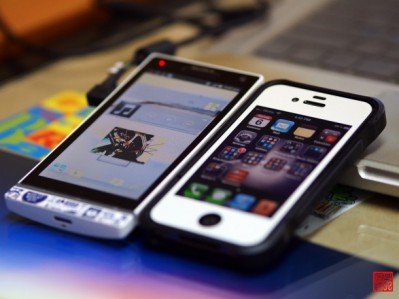[translations idioma=”ES” url=”https://archives.rgnn.org/2014/09/25/guia-de-madrid-telefonos-moviles/”]
As the capital city of Spain, Madrid is a beautiful and lively city that has a range of different activities and places to see. MADbudget offers some insider’s guides to the lifestyle of Madrid and essential information for anyone planning a visit to the city.
MADRID, SPAIN. There are two options for phones in Madrid: a Sim Card or an international plan for your own phone from your carrier at home. The costs of these plans will vary depending on your carrier, or, if you do not wish to buy an international plan, you can buy a phone upon arrival.
The two most popular phone carriers here are Vodafone and Orange. Some supermarkets also sell mobile phones. They offer many kinds of phones, from iPhones, to flip phones. The workers tend to speak English, which makes it easy to communicate and learn the necessary information.
The less advanced and recent the phone, the cheaper it is.
You can load your phone with minutes whenever you want at an ATM or at the phone store. When you receive your phone, you will also get a charger and a card with all of your phone information, including the PIN number. You should memorize this number and carry it with you at all times because if your phone turns off, the PIN number in order to unlock it. Good Apps for your Phone include:
Metro Madrid App—this app gives you a map of all of the metros, along with an option to map your route from start point to end point.
WhatsApp—most Spainards use this as a form of texting. Therefore, it is easiest to communicate with new Spanish friends via this app.
Viber—Viber is a free app that allows you to call your friends and family at home for free whenever you have WiFi.
Google Maps—the best app to direct you around Madrid.
Word Reference—this app provides you with an online dictionary from Spanish to English.
Spain Travel Guide—provides a complete guide to Spain and works well without WiFi It also provides a guide to the attractions in the area, as well as a phrasebook for the Spanish, Catalan, Basque and Galician, all of which are spoken within Spain.
If you bring your phone from home, WiFi is not generally easily available, as most are locked with passwords. However, you can go to restaurants such as Starbucks and other cafes equipped with free WiFi, often without the need for a password. Depending on where you are staying, most hotels, apartments, and hostels have their own WiFi which you will be able to connect to with a password provided.
Whether prepaid or a plan, having a mobile phone in Spain is important for getting around and staying in contact with those back home and those you meet.

